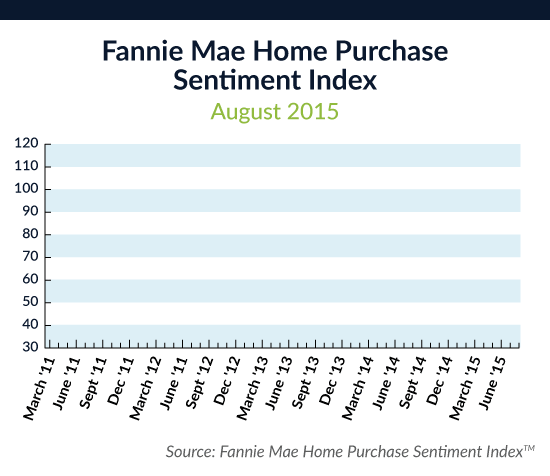Fannie Mae's Economic & Strategic Research Group have taken the company's National Housing Survey (NHS), conducted since 2011, and attempted to distill and quantify some of the responses into a single monthly predictive indicator, their Home Purchase Sentiment Index. The HPSI, its creators say, is designed to provide distinct signals about the direction of the housing market, helping industry participants to make better informed business decisions.
Fannie Mae notes that while there are other general indices of consumer economic sentiment, this will be the first dedicated entirely to housing. It uses the answers to six specific NHS questions that solicit consumers' evaluations of housing market conditions and address topics that are related to their home purchase decisions.
The index is based on six questions which cover consumer opinions on the following:
- Is it a very good time to buy a house, a somewhat good time, a somewhat bad time, or a very bad time to buy a house? To sell a house?
- Over the next 12 months, will home prices in general will go up, go down, or stay the same as where they are now? What about mortgage interest rates?
- Are you very concerned, somewhat concerned, not very concerned, or not at all concerned that you will lose your job in the next twelve months?
- How does your current monthly household income compare to what it was twelve months ago?
While Fannie Mae has constructed the index to reflect conditions back to the beginning of the NHS, this first public release reflects the HPSI as of August 2015. At that point the index stood at 80.8, down 0.5 point from July, continuing the decline from its all-time peak in June 2015. The HPSI is up 5.3 points since this time last year. On net, two components of the HPSI improved in August, with Confidence about Not Losing Job increasing 3 points and Good Time to Sell increasing 1 point. Home Price and Mortgage Rate net expectations both fell 3 points since last month.

- The percent of respondents who said that it is a good time to buy a house rose to 63 percent, 2 points above last month's all-time survey low.
- Those who say it is a good time to sell rose 2 points to 47 percent. The percent of respondents who say it is a bad time to sell also increased to 44 percent.
- The percent of respondents predicting a rise in home prices over the next 12 months fell to 47 percent. The percent who said that home prices will go down rose to 9 percent.
- The share who expect mortgage interest rates to go up in the next 12 months rose 3 percentage points to 54 percent. Only 5 percent say they will go down, unchanged from July.
- The share of respondents who say they are not concerned with losing their job rose to 83 percent, while the share of respondents who say they are concerned with losing their job fell to 16 percent.
- The share of respondents who say their household income is significantly higher than it was 12 months ago fell to 24 percent, while those who say it is significantly lower fell to 12 percent.
Doug Duncan, senior vice president and chief economist at Fannie Mae said, "Consumer attitudes toward the current home selling climate have slid back to their April 2015 level, contributing to a slight decline in the August HPSI reading relative to its four-year high, reached two months ago. Expectations of rising mortgage rates and increasing concerns in the last six months about the direction of the economy seem to be weighing on consumers' assessment of the housing market.
"Those who think it's a good time to buy or sell a home have consistently pointed to favorable mortgage rates as the primary reason for their optimism," Duncan said. "Those who think it's a bad time to buy or sell a home have consistently pointed to unfavorable economic conditions as the primary reason for their pessimism. Still, the four-year upward trend in the HPSI indicates that consumers remain fairly optimistic about the housing market."







